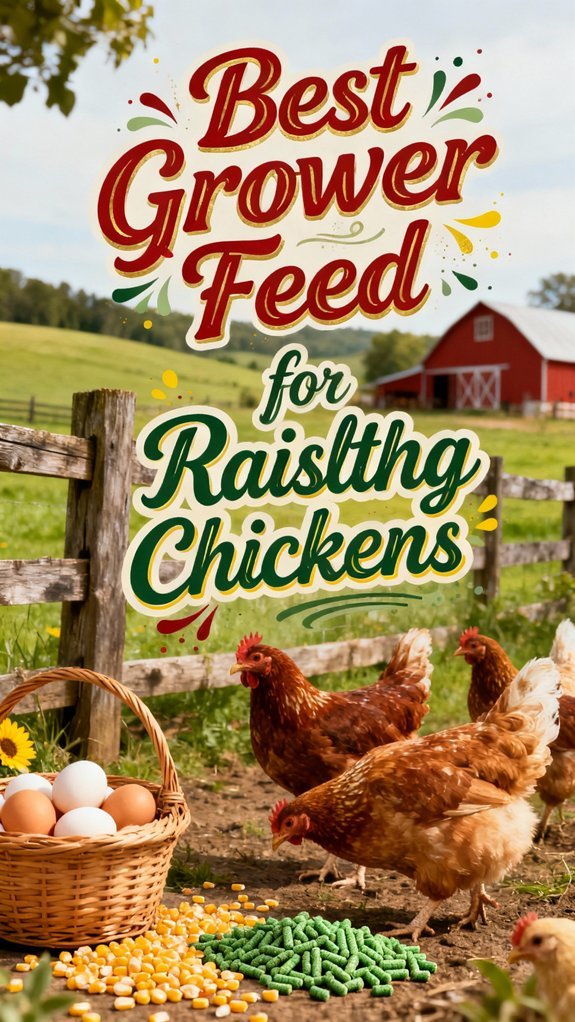You can treat chicken parasites with copper sulfate by administering 1/4 teaspoon per gallon of drinking water for 3-5 consecutive days. It’s effective against intestinal worms, protozoal infections, and coccidiosis when properly dosed. Prepare a stock solution by mixing 0.5 lb copper sulfate with 0.5 cup vinegar in a gallon of water, using only non-metallic containers. While this treatment is efficient, understanding proper protocols guarantees ideal results and bird safety.
Understanding Copper Sulfate in Poultry Health
While copper sulfate has gained prominence in poultry health management, its fundamental role stems from copper’s essential functions as a trace mineral in chickens. You’ll find copper benefits extend far beyond basic nutrition, as it’s imperative for immune function, antioxidant defense, and bone strength.
Copper participates in critical enzyme systems, including copper-zinc superoxide dismutase and cytochrome c oxidase, which are necessary for metabolism and tissue formation. It’s particularly notable for enhancing poultry immunity through multiple pathways, including prostaglandin synthesis and inflammation reduction. At nutritional levels of 5-30 ppm, copper supports ideal growth and performance by improving nutrient metabolism and immune status. Through its role in hemoglobin synthesis and erythrocyte production, copper guarantees proper oxygen transport throughout your birds’ systems. The high copper inclusion in feed significantly improves gut health and feed efficiency while managing gastrointestinal microbes.
Common Parasites and Infections Treated
Copper sulfate’s role extends beyond nutritional benefits to combat multiple parasitic and infectious agents in poultry. You’ll find it particularly effective against intestinal worms and various protozoal infections, with coccidiosis being a primary target. This versatile compound also addresses fungal conditions like sour crop caused by Candida albicans. Regular monitoring helps detect signs of crop impaction issues early when using copper sulfate treatments.
When you’re managing your flock’s health, you’ll notice copper sulfate’s broad-spectrum effectiveness against bacterial pathogens in both water and feed systems. It’s especially valuable in treating conditions like blackhead in turkeys and canker in pigeons. As part of your preventative care strategy, you can use it to maintain gastrointestinal health and prevent disease outbreaks. Unlike water-soluble antibiotics that require veterinary prescription since 2017, copper sulfate remains available for backyard flock owners. While it’s often cost-effective, you must carefully monitor dosage to avoid toxicity risks.
Proper Dosage and Solution Preparation
To guarantee effective parasite treatment in your poultry flock, precise measurement and preparation of copper sulfate solutions is essential. You’ll need to use accurate measuring tools when preparing either a stock solution or direct treatment mixture. For standard treatment, dissolve 1/4 teaspoon of copper sulfate per gallon of drinking water, or create a stock solution using 0.5 lb copper sulfate with 0.5 cup vinegar per gallon of water.
For enhanced solution stability, add vinegar to acidify the mixture. You can administer the treatment for 3-5 consecutive days, but don’t exceed this duration to prevent toxicity. When mixing with feed additives, combine the copper sulfate with milk or yogurt to improve palatability. Always verify the copper sulfate completely dissolves before offering it to your chickens. While treating your flock, you can supplement their diet with fresh treats like peach flesh and skin, which provide beneficial vitamins and antioxidants to support their immune system during recovery. To further support laying hens during treatment, offer crushed eggshells separately from their regular feed so they can self-regulate their calcium intake and maintain strong egg production. Maintain this twice weekly dosing schedule for approximately one month to ensure complete parasite elimination.
Safety Precautions and Considerations
Although copper sulfate effectively treats poultry parasites, implementing proper safety measures remains critical for both handlers and birds. When following application methods, you’ll need to use only plastic or rubber waterers, as copper sulfate reacts with metal containers. Creating a proper stock solution blend helps ensure accurate dosing for your flock’s drinking water. Don’t combine it with other treatments without veterinary approval, and always wear protective gloves during handling.
Your safety protocols should include secure storage away from children and pets, prompt cleanup of spills, and proper disposal of unused solutions to prevent environmental contamination. Monitor your flock closely for signs of copper toxicity, including lethargy, reduced appetite, or diarrhea. If you notice adverse effects, immediately discontinue treatment and provide fresh water. Keep detailed records of treatments and maintain regular health checks to guarantee your birds’ safety during copper sulfate administration. Similar to ensuring proper nesting box dimensions for different chicken breeds, accurate measurements and specifications are essential when dosing treatments to maintain flock health. Pay special attention to the area around the vent opening, as this region can show early signs of health issues or irritation from treatments.
Treatment Duration and Protocol
When treating poultry with copper sulfate solutions, you’ll need to follow precise dosing protocols based on the specific parasite or condition being addressed. Administer 1 oz per 5 gallons of water for most bacterial and coccidial infections, while sour crop requires a more concentrated solution of 1 oz per gallon using an acidified stock mixture. For thrush conditions specifically, mix 0.5 lb copper sulfate with vinegar per gallon of water.
The standard treatment length shouldn’t exceed 3 consecutive days to prevent toxicity. You’ll need to prepare fresh solutions daily and use non-metallic containers when incorporating acidifiers. Monitor your birds closely for adverse reactions, considering recalibrating dosages if necessary. For ongoing prevention, especially in cases like pigeon canker, implement intermittent treatments 2-3 times weekly rather than continuous administration. Combine with supportive therapies when treating severe parasitic infections. When managing mixed flocks, ensure proper flock management practices to maintain the health of all birds, including any guinea fowl kept alongside chickens. After any treatment, return birds promptly to a warm brooder environment to prevent stress and chilling that could compromise their recovery.
Environmental Management During Treatment
Effective environmental management is essential during copper sulfate treatments to prevent ecosystem contamination while maximizing therapeutic outcomes. You’ll need to carefully monitor copper runoff, particularly in flood-prone areas, as the compound’s high water solubility can impact aquatic ecosystems and soil health.
Maintain strict biosecurity by restricting access to poultry houses and removing potential attractants for wild animals. You should clean waterers and feeders every 2-3 days, while keeping litter dry and well-ventilated. With an estimated 200,000 tons per year of global copper sulfate usage, proper disposal methods are critical to minimize environmental impact. When applying copper sulfate solutions, avoid excessive spraying that could lead to environmental accumulation.
During treatment, it’s vital to manage waste properly and maintain proper dilution ratios in drinking water systems. You’ll need to regularly clean and disinfect all equipment to prevent parasite reinfestation while minimizing environmental impact.
Signs of Successful Treatment
Monitoring your chickens for specific indicators will help determine if the copper sulfate treatment is working successfully. You’ll notice signs of improvement when your birds display increased appetite and activity levels. A successfully treated crop will show reduced dilation and elimination of the characteristic sour smell associated with fungal infections.
Watch for successful recovery markers in your flock’s behavior and physical condition. The crop should empty normally, and you shouldn’t feel any unusual firmness or swelling during routine health checks. Your chickens should return to normal feeding patterns, and symptoms like lethargy or watery diarrhea should resolve. If you’ve been manually emptying the crop as part of treatment, you’ll observe the contents becoming clearer and less problematic over time. To support recovery and maintain overall health, consider supplementing with herbs that have antiparasitic properties, such as fresh mint in their diet. Additionally, providing dust baths with diatomaceous earth can help your recovering chickens naturally eliminate external parasites while they regain their strength. Remember to prepare fresh solution daily to maintain effective treatment levels throughout the recovery period.
Alternative Natural Remedies and Combinations
While copper sulfate offers proven parasite control, numerous natural alternatives provide effective treatment options for chicken keepers. You’ll find potent natural dewormers in garlic, which contains allicin compounds that break down into parasite-toxic sulfides when crushed and aged for 24 hours. Herbal combinations incorporating wormwood species deliver thujone, a powerful antiparasitic neurotoxin, while pumpkin seeds contribute vermifuge effects through cucurbitine content. For external parasites, you can apply mixtures of wormwood, neem, and diatomaceous earth every two days. Diatomaceous earth works by using its sharp silica particles to physically damage external parasites like red mites and lice when applied in coops and dust baths. To enhance effectiveness, combine these treatments with preventative measures like adding garlic and apple cider vinegar to drinking water. Adding herbs like mint and rosemary to nesting boxes can further support parasite deterrence while providing respiratory health benefits and reducing stress in your flock. When using potent herbs such as wormwood, maintain careful dosing to prevent toxicity while ensuring therapeutic effects. Regular fecal sample testing helps determine if natural treatments are effectively controlling internal parasites.
Storage and Handling Guidelines
For safe handling of copper sulfate, proper storage and precautionary measures remain essential to maintain product efficacy and prevent environmental contamination. You’ll need to employ specific storage methods using only non-metallic containers made of glass or heavy-duty plastic, as copper sulfate corrodes metal surfaces. When treating poultry, remember that one ounce treats five gallons of water.
When implementing storage methods, make certain you’re keeping containers in a cool, dry, dark location, away from food items and water sources. You must clearly label all container types with contents and expiration dates. Don’t store diluted solutions longer than three days, and always keep the product in its original packaging when possible. While handling, you’ll need to wear protective gear including gloves and eyewear. After use, clean all equipment thoroughly and dispose of unused product according to local hazardous waste regulations. Just as nesting boxes should provide a secluded dark environment to encourage healthy laying behavior, proper storage conditions help maintain chemical stability and effectiveness. Maintaining proper environmental management helps reduce stress on your flock, which is particularly important for winter layers that continue producing eggs during colder months.
When to Seek Veterinary Care
Identifying the right time to consult a veterinarian is essential when managing parasitic infections in your chicken flock. You’ll need professional veterinary assessment if you notice declining egg production, weight loss, or general health deterioration despite routine care measures. Heavily infested flocks will require treatment as frequently as every 3 weeks to control parasite levels.
Don’t attempt to diagnose severe infestations without expert help. Your veterinarian can perform vital fecal examinations to determine the specific parasites present and their burden level. They’ll also provide necessary prescriptions for extra-label medications when standard treatments aren’t effective. Proper symptom recognition and timely veterinary intervention are significant, especially since some parasites, like tapeworms, lack approved treatments in the U.S. Remember that continuous use of over-the-counter dewormers without professional guidance can lead to resistance, making future treatments less effective. While managing your flock’s health, ensure you’re also providing a balanced diet alongside regular feed, grains, greens, and protein to support their immune system and overall wellness. Adding fresh herbs like cilantro can provide antioxidants and vitamins that boost immune health and support your chickens’ overall well-being.





